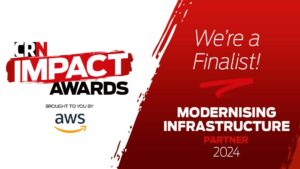Blog:

In today’s fast-paced and customer-centric business landscape, enterprises are looking to deepen their understanding of clients across all touchpoints. One key strategy is to integrate customer relationship management (CRM) data with enterprise resource planning (ERP) systems. A powerful combination when successfully deployed, it can give your business a 360-degree view of your customers, leading to enhanced customer experiences and better business outcomes.
Integrating CRM data with an ERP system means you can consolidate a wealth of customer information into a centralised silo. By bringing together data from multiple touchpoints – such as sales, marketing and customer support – you can create a comprehensive profile of every type of client.
With this consolidated view, you can now get a deeper understanding of your customers’ behaviours, preferences and purchasing histories. And armed with these insights, you can make more informed, data-driven decisions to personalise your interactions and tailor your offerings to meet ever-changing customer needs.
Looking to create highly targeted and personalised marketing campaigns? With access to comprehensive customer data, you can segment your customer base and deliver tailored offerings according to specific demographics, previous purchases or browsing trends and behaviours.
Providing customers with relevant and timely content also means you can start to leverage better engagement, foster more brand loyalty and drive up conversions.
It’s a proactive approach to customer service to integrate your ERP and CRM systems. Analysing customer data in real-time means you can identify patterns and anticipate customer needs. You can also take steps to address any potentially disruptive issues before they snowball.
Take, for example, a customer’s preferred product being out of stock. With an integrated system, it can automatically trigger a proactive communication, offering alternative options or notifying them when the product becomes available. Such a mindset means you can foster trust, satisfaction and loyalty far more easily in your existing customer base – which is ultimately your most valuable segment.
Modern customers expect a seamless experience across all channels – online, mobile and in-store. ERP–CRM integration is what enables businesses to deliver a unified, consistent experience across all touchpoints. Your customer’s interactions and preferences can be synced between the CRM and ERP systems, ensuring they receive the same level of personalisation and service they are used to – regardless of the channel they use.
Perhaps more importantly, the positive impact of ERP–CRM integration on customer satisfaction and loyalty cannot be overstated. You want to give them a personalised experience and resolve any issues that may crop up well ahead of time. Because you are now leveraging integrated data, your enterprise can anticipate customers’ needs. The result? Higher customer satisfaction, which naturally leads to greater loyalty and repeat business.
The bottom line: satisfied customers are more likely to become brand advocates, spreading positive word-of-mouth and contributing to the growth and success of your business.
ERP and CRM integration is a smart strategy that can empower your enterprise and help it achieve a more comprehensive understanding of your customers – with the outcome of delivering exceptional experiences across all touchpoints. That’s why embracing ERP–CRM integration is no longer a ‘maybe’ – it’s a necessity for enterprises that want to thrive in an increasingly competitive marketplace.

Wild Tech has been recognised for the work that we did in undertaking an end-to-end modernisation activity for Uncle Bills.
Read More
AI has the potential to underpin so much of the manufacturing process and drive the industry 4.0 transformational change across the sector.
Read More
Will recent AI advances threaten human existence or, conversely, fulfil all our desires –or is this just the latest in a long series of repetitive hype cycles that will soon come crashing down?
Read MoreWe’re here to listen and to solve your problems then help you to digitalise your business. Let’s talk.